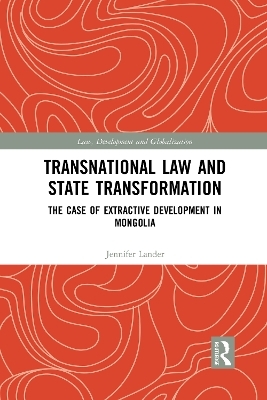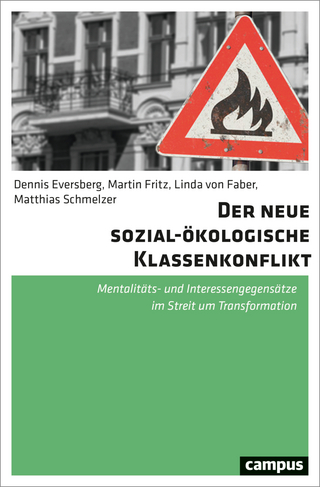
Transnational Law and State Transformation
Routledge (Verlag)
978-1-032-08606-4 (ISBN)
The role of transnational economic law in influencing and reorganising national systems of governance evidences the constitutional dimensions of global capitalism: the power to institute new rules and limits for national states. This form of new constitutionalism does not undermine the state but transforms it by eroding national capacities and implanting global alternatives. While leading scholars in the field have emphasised the much-needed value of case studies, there are no studies available which consider the cumulative impact of multiple axes of transnational legal ordering on the national state or its constitution. This monograph addresses this empirical gap, whilst expanding the theoretical scope of the field. Mongolia’s recent transformation as a mineral-exporting country provides a rare opportunity to witness economic and legal globalisation in process. Based on careful empirical analysis of national law and policy-making, the book traces the way distinctive processes of transnational legal ordering have reorganised and reframed the governance of Mongolia’s mining sector, specifically by redistributing state power in relation to the market, sub-national administrations and civil society. The book investigates the role of international financial institutions, multinational corporations and non-governmental organisations in normative transmission, as well as the critical role of national actors in embedding transnational investment norms within the domestic legal and policy environment. As the book demonstrates, however, the constitutional ramifications of transnational legal ordering extend beyond the mining regime itself into more fundamental questions of the trajectory of state transformation, institutionally and ideologically.
The book will be of interest to scholars of international law, global governance and the political economy of development.
Jennifer Lander is a Lecturer in Law at De Montfort University, UK
Preface Part I: Theory and Summary of the Book 1 Transnational Law, State Transformation and Global Markets: Economic Development and Material Constitutional Change, Decoding "Development": A Socio-Legal Approach, Development Code-Cracking: The Conceptual Origin Story of the Book, Parts of a Whole: State, Law and Market from Material Constitutional Perspective, Seeking Reward and Mitigating Risk: The Changing Dynamics of "Development" in the Global Economy, Development as State Modernisation, Development as Marketisation, Building Markets, Building States: Understanding the Contemporary Paradigm, Contextualising Extractive Development, Conclusion 2 Introduction to the Case Study, Constituting a Resource Frontier in Outer Mongolia, Chapter Outline, A Note on Research Methods, Part II: The Case Study 3 State, Law and Economy in Mongolia: An Historical Overview, Introduction: Tracing Material Constitutional Change over Time, State-Economic Relations Prior to the National State: An Overview of the Mongol Aristocratic-Pastoral Order (Twelfth – Twentieth Centuries), Socio-Political Constitution of the Early Mongol State, Sustaining the Aristocratic State: Embedded Economy and Customary Norms, Distinguishing the Economic from the Political: State Socialism, National Industrialisation and Regional Integration in the Soviet Union (1924-1990), A Shifting Situation: New Geopolitical Challenges in the Early Twentieth Century, Socialist Constitutionalism: New Institutions and Revolutionary Legality for the Mongol People’s Republic, Introducing "Economic Development" into Mongol Steppe Society, Democratising the Government, Depoliticising the Economy? The Post-Socialist Mongolian State, (Re)constitutionalisation Part I: A New Blueprint for Accumulation, (Re)constitutionalisation Part II: A New Political-Legal Regime, Mongolia as a Model Market Democracy?, Conclusion 4 See-Saws of Instability: Mongolia’s Mining Regime from 1994-2014, Introduction, 1994-2002: Making a Minerals Market on the "Final Frontier", 2002-2006: Re-evaluating the State-Market Balance, 2006-2009: State-Market Compromise and the Oyu Tolgoi Investment Agreement, 2009-2013: Optimism and Entanglement, 2014: Facing the Crisis of Transnational Capital and Confidence, Conclusion 5 After the Crisis: Strategies for Stabilisation within the State, Introduction, Unstable Institutions at the Centre and the Periphery: Curtailing Political Risk within the State for Foreign Investment, Conflict at the Core: Parliament, Politicians and "Resource Nationalism", Conflict at the Periphery: Local Governments, Rent-Seeking and Corruption, Stabilisation Mechanisms: Blurring Public-Private Boundaries and Strengthening Executive Authority in the Mining Regime, Blurring the Public-Private Divide at the Central and Sub-National Scales, Deepening Executive Power within Central and Sub-National Administrations, Conclusion 5 Redefining Resistance: Strategies for Stabilisation in State-Society Relations, Introduction, Organised Civil Society in Mongolia: An Overview, The Law and Politics of Exclusion in the Making of a "Civil" Society: Limiting Political Risk from Environmental Activists, The Emergence of Environmental Activism around Mining in Mongolia, Stabilisation Mechanism I: Excluding Dissent through Institutional Disassociation and State Criminalisation, Stabilisation Mechanism II: Inclusion Through Multi-Stakeholder Dialogue, Consensus Building and the Narrative of "Shared Responsibility", Governing Political Risk for Mining Projects through the Norms and Mechanisms of Corporate Social Responsibility: Tracing a Transnational Normative Agenda, Institutionalising Multi-Stakeholder Norms and Practices in Mongolia’s Mining Regime: The Extractive Industries Transparency Initiative and the Integrated Mineral Resource Initiative, Non-State Dispute Resolution and Conflict Mediation: The Role of the International Finance Corporation in the South Gobi, Summary of Case Studies, Conclusion, Part III: Theoretical Reflections 6 Transnational Legal Ordering and State Transformation in Mongolia: Summarising the Case Study, Introduction, Transnational Legal Ordering, Stabilising Mongolia’s Investment Environment as a Process of Transnational Legal Ordering, Substantive Legal Reform, Changes in the Boundary between the State and the Market, and other Forms of Social Ordering, Changes in the Institutional Architecture of the State, Enhancement of Professional Expertise and its Role in Governance, Change in Associational Patterns Instituted through Transnational Mechanisms of Accountability with Accompanying Normative Frames, Summary 7 The Legal and Political Costs of Transnational Legal Ordering in Mongolia’s Mining Regime, "Who Cares about Politics?" Setting out the Significance of Transnational Legal Ordering for Democratic Politics in Mongolia, A New Rule for the Rule of Law? Stability as the new Grundnorm for Mining Law and Policy, ‘It is Our Destiny to Work with Our Neighbours’: From Geo-Politics to Geo-Economics, The Law of Unintended Consequences: Perils in New Patterns of State Transformation, Conclusion 8 Reflecting on Material Constitutional Change in Mongolia, Seeing the Forest for the Trees
| Erscheinungsdatum | 01.07.2021 |
|---|---|
| Reihe/Serie | Law, Development and Globalization |
| Zusatzinfo | 5 Illustrations, black and white |
| Verlagsort | London |
| Sprache | englisch |
| Maße | 156 x 234 mm |
| Gewicht | 417 g |
| Themenwelt | Recht / Steuern ► Allgemeines / Lexika |
| Recht / Steuern ► EU / Internationales Recht | |
| Sozialwissenschaften ► Politik / Verwaltung | |
| Sozialwissenschaften ► Soziologie ► Spezielle Soziologien | |
| Technik ► Bergbau | |
| Wirtschaft ► Volkswirtschaftslehre ► Makroökonomie | |
| ISBN-10 | 1-032-08606-8 / 1032086068 |
| ISBN-13 | 978-1-032-08606-4 / 9781032086064 |
| Zustand | Neuware |
| Informationen gemäß Produktsicherheitsverordnung (GPSR) | |
| Haben Sie eine Frage zum Produkt? |
aus dem Bereich


